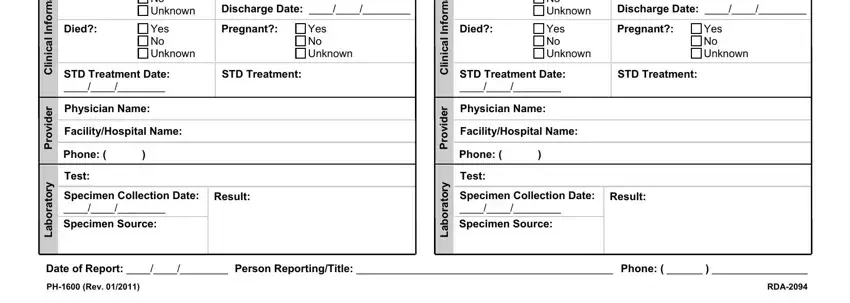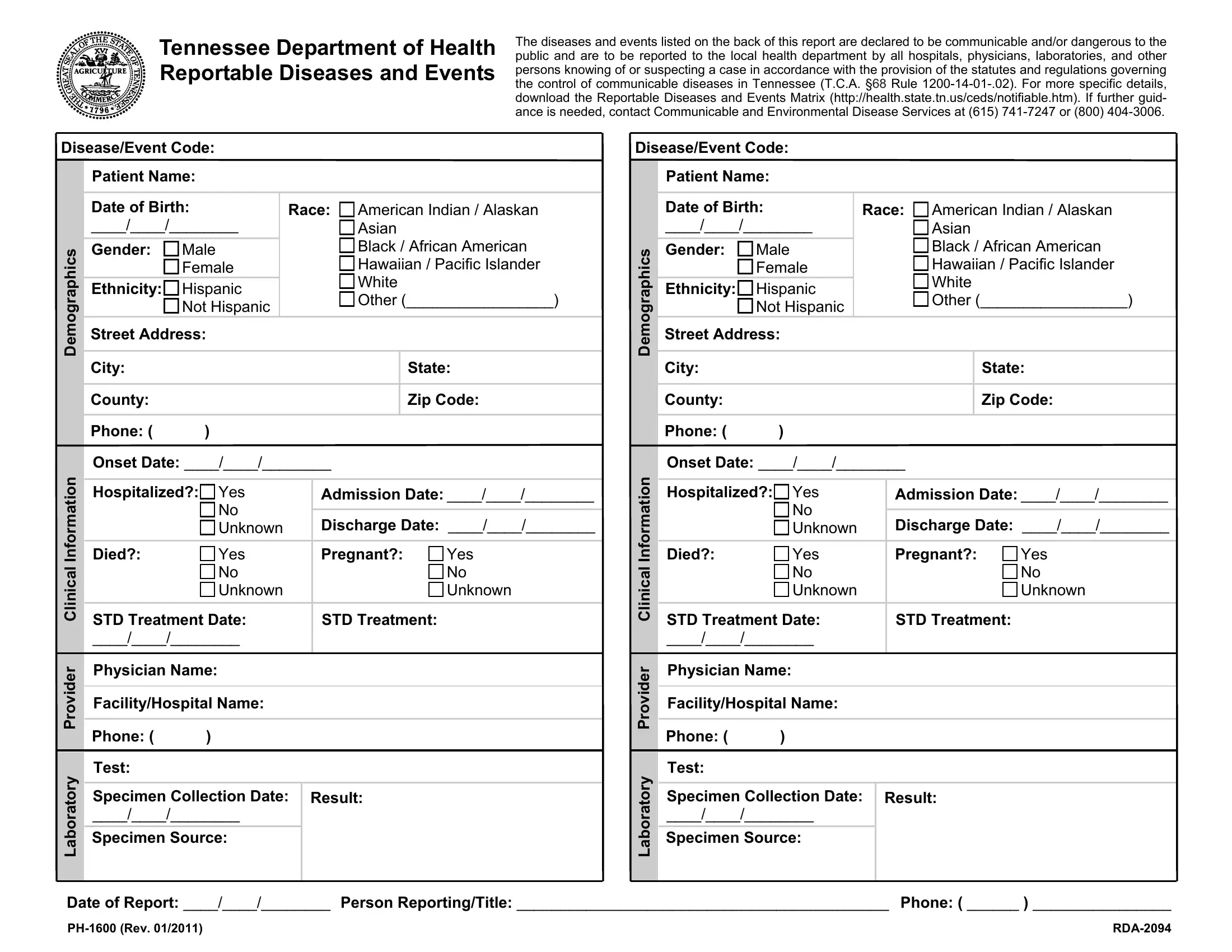[006]Brucellosis (Brucella species)B
[010]Congenital Rubella Syndrome
[011]Diphtheria (Corynebacterium diphtheriae)
[121]Encephalitis, Arboviral: California/LaCrosse Serogroup
[123]Encephalitis, Arboviral: Eastern Equine
[122]Encephalitis, Arboviral: St. Louis
[124]Encephalitis, Arboviral: Western Equine
[506]Enterobacteriaceae, Carbapenem-resistant
[053]Group A Streptococcal Invasive Disease (Streptococcus pyogenes)
[047]Group B Streptococcal Invasive Disease (Streptococcus
agalactiae)
[054]Haemophilus influenzae Invasive Disease
[016]Hepatitis, Viral-Type A acute
[513]Influenza-associated deaths, age <18 years
[520]Influenza-associated deaths, pregnancy-associated
Category 2: Requires written report using form PH-1600 within 1 week.
[501]Babesiosis
[003]Botulism-Infant (Clostridium botulinum)
[007]Campylobacteriosis (including EIA or PCR positive stools)
[503]Chagas Disease
[069]Chancroid
[055]Chlamydia trachomatis-Genital
[057]Chlamydia trachomatis-Other
[056]Chlamydia trachomatis-PID
[009]Cholera (Vibrio cholerae)
[001]Cryptosporidiosis (Cryptosporidium species)
[106]Cyclosporiasis (Cyclospora species)
[504]Dengue Fever
[116]Ehrlichiosis-HGE (Anaplasma phagocytophilum)
[051]Ehrlichiosis-HME (Ehrlichia chaffeensis)
[117]Ehrlichiosis/Anaplasmosis-Other
[060]Gonorrhea-Genital (Neisseria gonorrhoeae)
[064]Gonorrhea-Opthalmic (Neisseria gonorrhoeae)
[061]Gonorrhea-Oral (Neisseria gonorrhoeae)
[063]Gonorrhea-PID (Neisseria gonorrhoeae)
[062]Gonorrhea-Rectal (Neisseria gonorrhoeae)
[133]Guillain-Barré syndrome
[058]Hemolytic Uremic Syndrome (HUS)
[480]Hepatitis, Viral-HbsAg positive infant
[048]Hepatitis, Viral-HbsAg positive pregnant female
[017]Hepatitis, Viral-Type B acute
[018]Hepatitis, Viral-Type C acute
[021]Legionellosis (Legionella species)
[022]Leprosy [Hansen Disease] (Mycobacterium leprae)
[094]Listeriosis (Listeria species)
[024]Lyme Disease (Borrelia burgdorferi)
[025]Malaria (Plasmodium species)
[515]Melioidosis (Burkholderia pseudomallei)
[102]Meningitis-Other Bacterial
[031]Mumps
[033]Plague (Yersinia pestis)B
[035]Poliomyelitis-Nonparalytic
[034]Poliomyelitis-Paralytic
[119]Prion disease-variant Creutzfeldt Jakob Disease
[109]Q Fever (Coxiella burnetii)B
[040]Rubella
[041]Salmonellosis: Typhoid Fever (Salmonella Typhi)
[131]Staphylococcus aureus: Vancomycin non-sensitive – all forms
[075]Syphilis (Treponema pallidum): Congenital
[519]Tuberculosis, confirmed and suspect cases of active disease
(Mycobacterium tuberculosis complex)
[113]Tularemia (Francisella tularensis)B
[118]Prion disease-Creutzfeldt Jakob Disease
[036]Psittacosis (Chlamydia psittaci)
[105]Rabies: Animal
[042]Salmonellosis: Other than S. Typhi (Salmonella species)
[517]Shiga-toxin producing Escherichia coli (including Shiga-like
toxin positive stools, E. coli O157 and E. coli non-O157)
[043]Shigellosis (Shigella species)
[039]Spotted Fever Rickettsiosis (Rickettsia species including Rocky
Mounted Spotted Fever)
[130]Staphylococcus aureus: Methicillin resistant Invasive Disease
[518]Streptococcus pneumoniae Invasive Disease (IPD)
[074]Syphilis (Treponema pallidum): Cardiovascular
[072]Syphilis (Treponema pallidum): Early Latent
[073]Syphilis (Treponema pallidum): Late Latent
[077]Syphilis (Treponema pallidum): Late Other
[076]Syphilis (Treponema pallidum): Neurological
[070]Syphilis (Treponema pallidum): Primary
[071]Syphilis (Treponema pallidum): Secondary
[078]Syphilis (Treponema pallidum): Unknown Latent
[044]Tetanus (Clostridium tetani)
[045]Toxic Shock Syndrome: Staphylococcal
[097]Toxic Shock Syndrome: Streptococcal
[046]Trichinosis
[101]Vancomycin resistant enterococci (VRE) Invasive Disease
[114]Varicella deaths
[104]Vibriosis (Vibrio species)
[125]West Nile virus Infections-Encephalitis
[126]West Nile virus Infections-Fever
[098]Yellow Fever
[103]Yersiniosis (Yersinia species)




